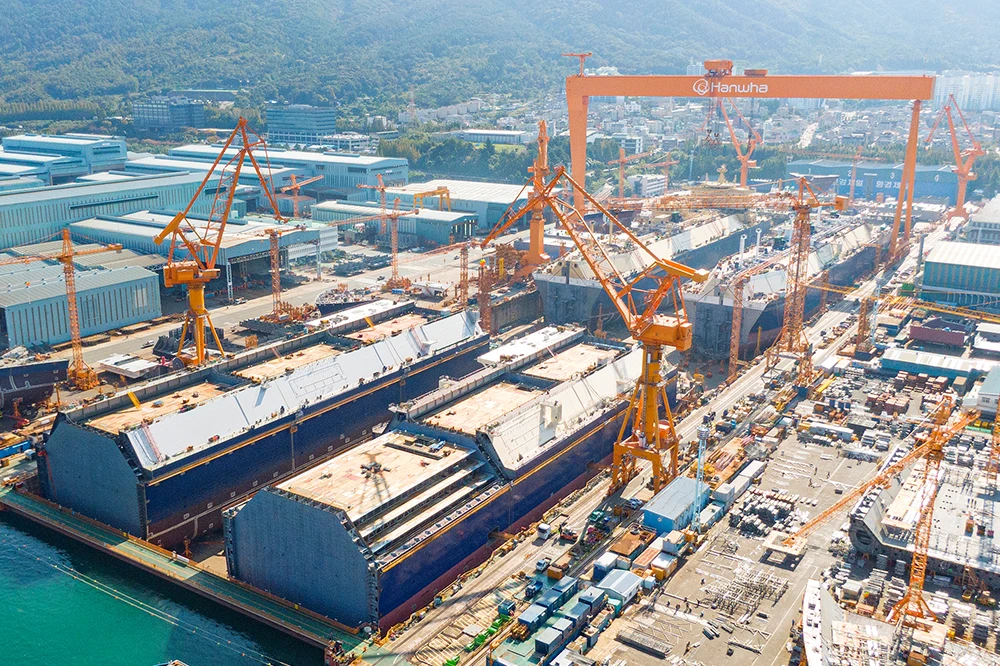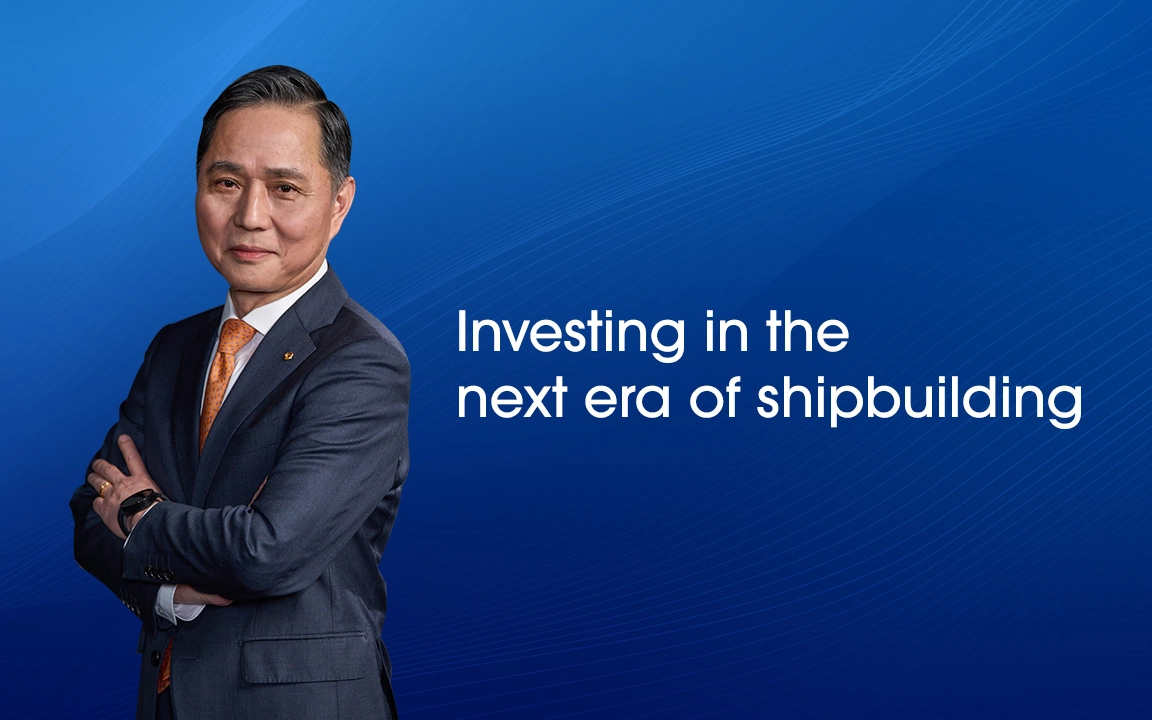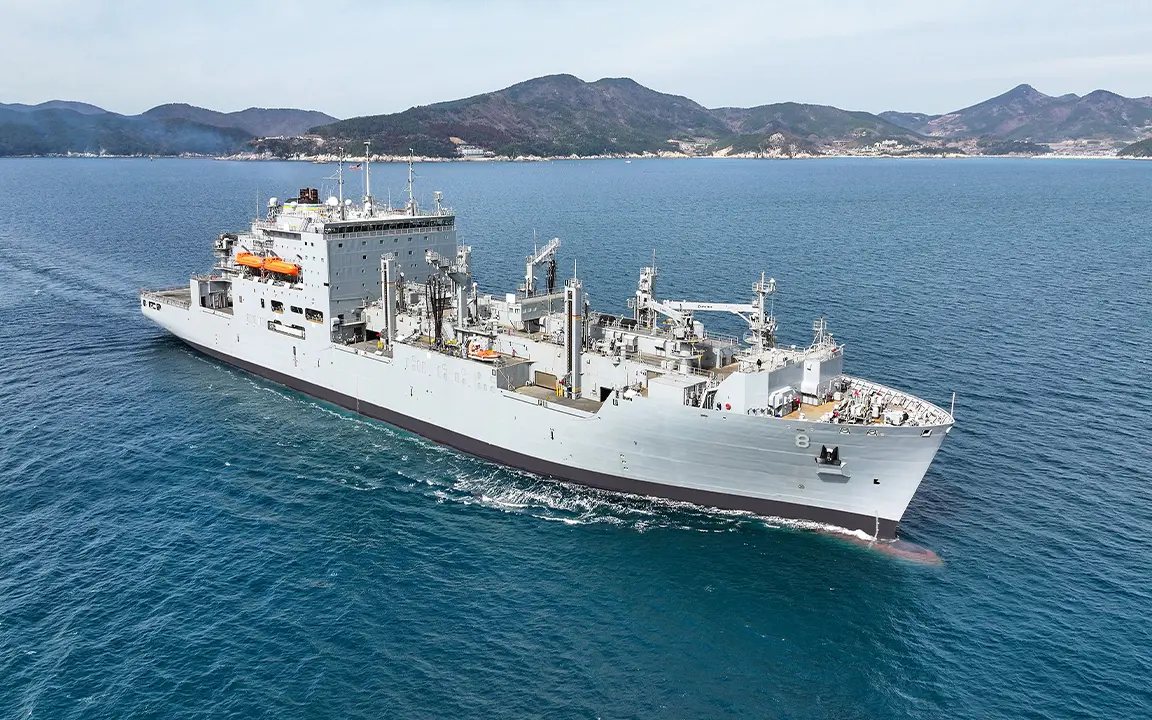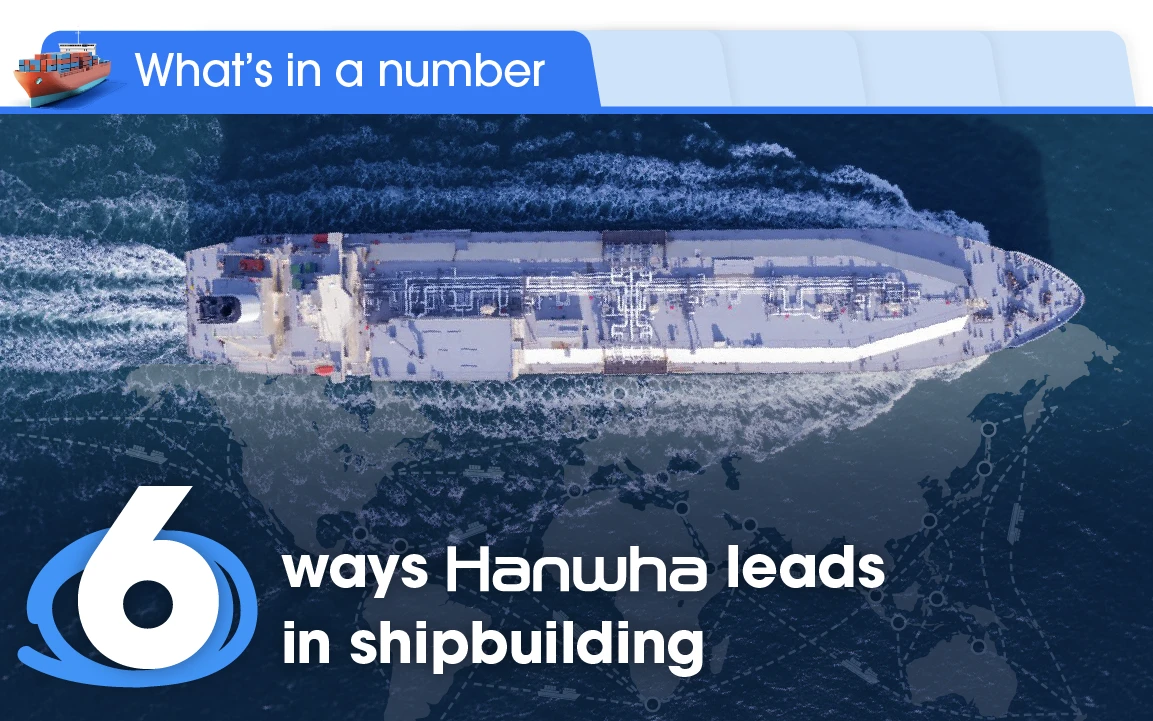Building resilience: How strategic partnerships are supporting U.S. industry

This content was produced in partnership with Custom Content from WSJ.
In an address to Congress this March, the White House declared a new era for American industry, promising to reassert the nation’s manufacturing might through a combination of domestic-focused policies and investments in new technologies and innovations. In its first 100 days, boosting domestic manufacturing, shipbuilding and energy security have emerged as clear priorities for the new administration. Doing so requires resources, talent and technology from eager investors.
Recognizing the strength of the American workforce and its entrepreneurial spirit, leading companies from around the globe are answering the call for partnership and investment as the U.S. seeks to unlock a new era of growth. This includes Hanwha, a South Korean business group that has committed billions of dollars to support vital sectors such as shipbuilding, a cornerstone of American economic power now poised for a renewal as part of a broader industrial push.
Ship shape: How international partnerships are supporting the U.S. maritime industry
The administration’s pledge to support the maritime industry—“to bring [it] home to America, where it belongs” — will be implemented in part by the White House’s new Office of Shipbuilding and will involve passing maritime legislation such as The Ships for America Act, which supports the country’s vessels, shipyards and maritime workforce development as critical components of national security. In April, President Trump issued an executive order directing the development of a Maritime Action Plan to help execute this vision.
In Philadelphia, where shipyards have launched vessels since 1676, progress is already underway — powered not by government alone, but by global investment aligned with American industrial goals.
“As the U.S. reinforces its leadership in manufacturing and innovation, we see this as a pivotal opportunity to partner in its industrial renewal,” says Dong Kwan Kim, vice chairman of Hanwha Group. “Our investments are focused on building long-term capacity in the U.S., bringing advanced technology and manufacturing expertise to key sites across the country.”
“The U.S. hasn’t had the opportunity to invest in shipbuilding infrastructure because it’s surviving contract-to-contract, leaving American yards outdated and outmoded,” says Salvatore Mercogliano, adjunct professor of history and engineering at the U.S. Merchant Marine Academy. “This is the importance of international companies wanting to help build an industrial base in the U.S.”
Last December, Hanwha — an industry leader with a world-class shipbuilding arm, Hanwha Ocean — acquired Philly Shipyard for $100 million. The historic shipyard has delivered more than half of the U.S.’s large Jones Act commercial vessels since 2000.
With the acquisition, Hanwha is focused on revitalizing the shipyard as part of a wider goal to support U.S. maritime capacity. “We see tremendous opportunity to bring our next-generation shipbuilding capabilities to the U.S.,” says Charles Kim, CEO of Hanwha Ocean. “By modernizing infrastructure, introducing new technologies and strengthening the workforce, we aim to create a hub that supports not only commercial needs, but future naval and energy requirements as well."
Drawing on decades of expertise and know-how, Hanwha Ocean is investing heavily in expanding Philly Shipyard’s capabilities with technological advancements, workforce training and smart systems — creating onboarding capacity and safe, advanced manufacturing jobs in the U.S.
“It will be an interesting marriage if they can bring Korean efficiency into American yards,” Mercogliano says. “Since shipbuilding allows you to feed businesses beyond the waterfront — into manufacturing bases and the like — creating a robust shipbuilding center creates positive knock-on effects across the entire industrial base.”

Hanwha Ocean’s shipyard near the Port of Okpo in Geoje, South Korea
The case for defense: Inroads into the U.S. naval market
Hanwha’s ambitions extend beyond commerce. The Philadelphia yard, once the birthplace of warships like the USS Franklin in 1815, will begin seeing large-scale capacity and capability upgrades that could support the Navy’s shipbuilding and repair needs. As a first step towards this long-term vision, Hanwha Ocean inked a Master Ship Repair Agreement with the Pentagon in June last year, allowing it to provide maintenance, repair and overhaul (MRO) services out of Philadelphia in the future.
“We have ambitious plans to modernize the yard and develop its workforce — but looking forward, we also see great potential in building a naval business that will bring additional capacity to U.S. industry,” says Michael Coulter, Hanwha Global Defense president and CEO.
Mercogliano also observes overlapping challenges between naval and commercial manufacturing operations: “There’s a cognizance now that maintaining this [commercial] capacity is a national security issue, which is also why shipbuilding is very bipartisan. We’re really at an inflection point and this administration appears to be going all-in.”
At its shipyard in Geoje, a major shipbuilding hub off the southern coast of South Korea, Hanwha has conducted two U.S. Navy repair projects — one completed and the other nearing its conclusion. Ultimately, the company aims to expand beyond Geoje to offer MRO services stateside.
Power play: How Hanwha is helping the U.S. boost energy security
The U.S. is seeking sources of power as surging demand from manufacturing, technology and defense sectors strains the country’s existing infrastructure. The Trump administration’s Executive Order 14156 labeled the situation a national emergency, calling for a “reliable, diversified and affordable supply of energy” to sustain critical industries and secure the nation’s economic future.
Positioning itself as a strategic ally in diversification, Hanwha’s U.S. commitments are twofold. First, it takes a holistic approach to the energy value chain, bringing its expertise not only to production, storage and power generation, but also transportation — this February, Hanwha became the first shipbuilder to deliver its 200th liquefied natural gas (LNG) carrier. Hanwha is also the largest shareholder in NextDecade, an LNG developer advancing a major export terminal in South Texas — critical infrastructure that supports America’s broader push for energy security.
Second, the company has made significant investments in solar energy, with $2.5 billion dedicated to Hanwha’s Qcells solar factories in Dalton and Cartersville, Georgia, together forming a large-scale manufacturing hub that brings the solar supply chain under one roof on American soil.
This solar push has already gained traction among technology leaders. In January 2024, the company signed a contract with Microsoft to supply solar modules and engineering, procurement and construction (EPC) services over the coming years; in June of the same year, it completed the creation of a 50-megawatt solar energy complex in Borrego Springs, California to supply Meta’s renewable energy needs.
But it’s not just about building panels; it’s also about securing America’s energy future. “We are actively supporting U.S. efforts to strengthen energy security by investing in key manufacturing facilities across the energy value chain,” says vice chairman Kim.
Rooted in innovation, Hanwha’s efforts speak to a wider industrial vision that spans multiple sectors, including shipbuilding, energy and defense. With a focus on commercially scalable technologies and advanced manufacturing, the company is investing across key markets to unlock further opportunities for shared growth. “We believe in building long-term resilience,” the vice chairman adds. “The U.S. is an incredibly important market for us, and our commitments today represent a firm belief in its industrial future.”

Get the latest news about Hanwha, right in your inbox.
Fields marked with * are mandatory.
- Non-employee
- Employee








